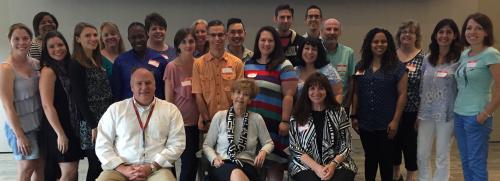
By Voon Pang
Stuttering Treatment and Research Trust, New Zealand
Aug. 14, 2018
I had the privilege of attending a 5-day Stuttering Foundation workshop in Philadelphia aimed at improving the clinical skills of speech-language pathologists when working with young people how stutter. This year’s workshop attendees were truly diverse with people travelling from as far as Nigeria, Poland, Chile, and Argentina. I traveled from New Zealand and flew over 20 hours to get to the United States of America!
The workshop faculty consisted of Joe Donaher, Vivian Sisskin and Michael Boyle, each of whom taught us through lectures, videos, guided practice and case study discussions. What was unique about this experience was that each of these experts had different mentors who mentored them to work in specific ways but when I stood back and reflected on their clinical styles, they had many similarities which aimed at helping the individual have more agency at reducing the problem of stuttering. I particularly enjoyed hearing Joe, Vivian and Michael pay more attention to the cognitive (thoughts and feelings) aspects of stuttering therapy and that the problem was not the stuttering itself, but how an individual reacted to a moment of stuttering. How an individual reacts in a moment of stuttering can lead to whether or not a person moves forward in their talking and stuttering or whether they become a walking museum of tricks in an effect to hide stuttering.
Michael also presented his research on self-stigma and called for speech-language pathologists to play more of an active role in educating the general lay-public so that the world is more accepting and supportive of people who stutter. This line of work is exciting as it flips the focus of therapy around to focus on making an individual’s environment more supportive rather than pressuring the individual to fit-in to society.
Some of my favourite learnings from the week were:
- The best stuttering therapy marries cognitive work and speech work. Addressing how someone who stutters feel AND helping them make speech changes provides a person with a choice on what they want to do.
- ‘Speech tools’ are a packaged way of getting people to make changes to talking and stuttering. Although helpful for some people, they can create an unhelpful pressure or expectation to use them all the time. Using a tool detracts from speaking spontaneously and knowing what to ‘do’ to have forward moving speech (i.e. children and parent get fixated on using tools rather than talking).
- Children with disfluent speech may have other underlying or co-occurring communication difficulties. Children with ADHD, ASD and language disorders who have disfluent speech or stuttered speech are the populations which speech-language pathologists need to step back and consider the whole picture on what is impacting a child’s communication.
- Speech-language pathologists still have a long way to go with changing how society views stuttering. We need to consider the difference we are making if older children who stutter do well in the clinic but go out into an environment where people don’t get it – can this be considered a true success when a person is ‘trapped’ into living a life as a fluent speaker when in fact they are a person who stutters?
- Every person who walks into a clinic door is an individual who will require different kinds of support at different times in their lives. A person who stutters spoke to our group and put it so eloquently that for him, stuttering therapy was about helping him navigate speaking contexts so that he could live a happy life. The idea that speech-language pathologists help people who stutter navigate communication environments much like a traveller navigates with a GPS when necessary was a helpful analogy to end the week.
As I finish this blog entry, I look back at far I’ve come and am excited to look forward to what I can continue doing to keep helping and supporting people who stutter. I would like to thank Jane Fraser and the Stuttering Foundation for their ongoing support with clinical skills training. Joe, Vivian, Michael and my wonderful SLP classmates from this year have made Philly a memorable learning experience. I would also like to thank my workplace, the Stuttering Treatment and Research Trust for supporting me with my ongoing professional development in the field of stuttering and related fluency disorders. Finally, thank you to the individuals and families I work with – it is you who make it all worthwhile and I am humbled to be able to make a difference.






 Podcast
Podcast Sign Up
Sign Up Virtual Learning
Virtual Learning Online CEUs
Online CEUs Streaming Video Library
Streaming Video Library